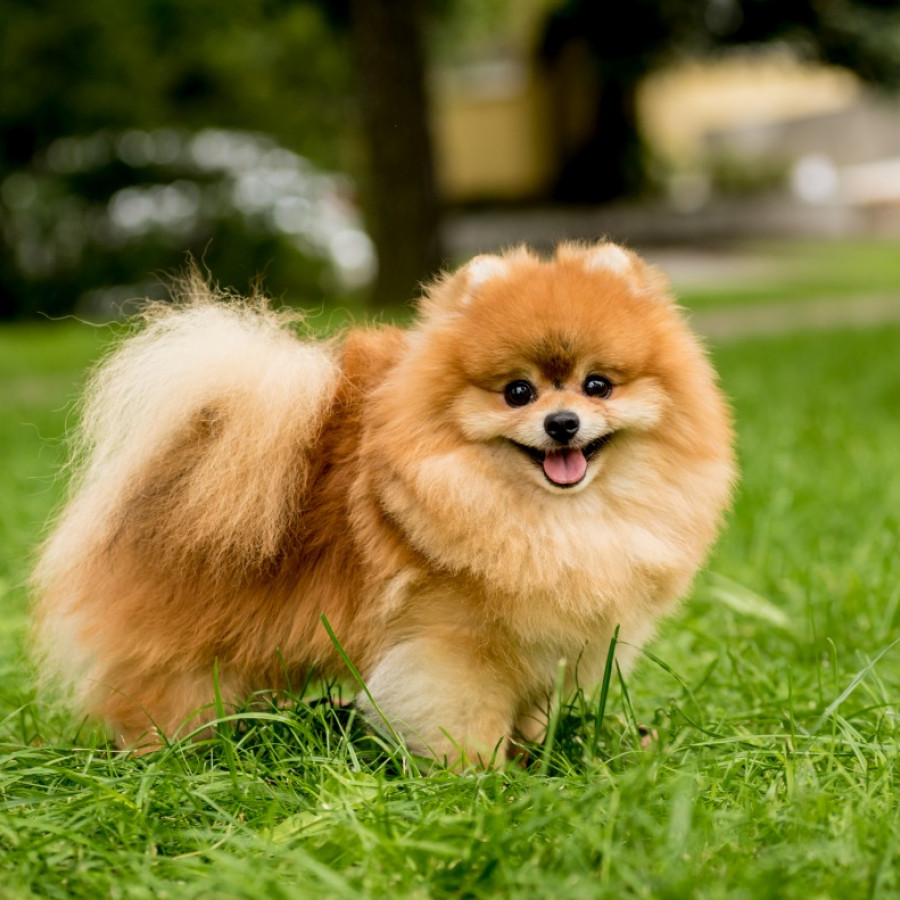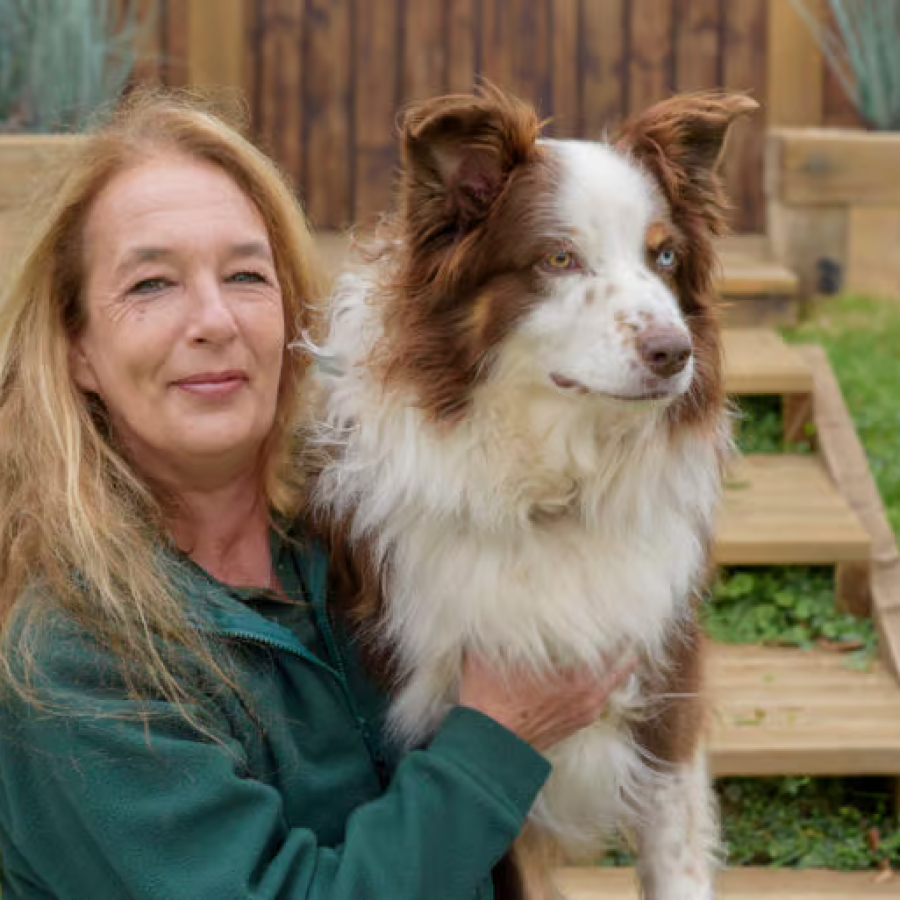
Pomeranian Dog Breed
The feisty but affectionate Pomeranian is a real pocket-rocket! They’re fluffy, bold and super snuggly.

The feisty but affectionate Pomeranian is a real pocket-rocket! They’re fluffy, bold and super snuggly.
Pomeranians are tiny fluffballs with big personalities!
These foxy, teddy-bear-like dynamos are smart, lively and bold. Oh, and they love being the centre of attention! But their determined and loud nature means they need patience and training.
Pomeranians thrive in homes where they can be the centre of attention but need families who can manage their feisty nature.
Don't let their size fool you – Pomeranians think they're as big as lions!
These spirited, intelligent little dogs are bursting with confidence. They adore companionship and will happily follow you around like a fluffy shadow.
Playful and curious, they enjoy games that challenge their minds and keep them entertained. But they can be quite vocal, ‘announcing’ every visitor or interesting sound with a bark – and then several more for good measure!
Their bold nature can lead them to find loopholes in your rules, so they benefit hugely from clear and consistent, reward-based training. Pomeranians are happiest when they're the star of the show, soaking up attention and being included in all your family’s adventures.
Disclaimer
While these breed traits give a general idea of what to expect from a specific type of dog, it's important to remember that every dog is unique. Just like people, each dog comes with their own distinct personality, quirks, and characteristics!

Pomeranians can make wonderful family dogs, especially in homes with older children who understand how to handle them gently. They don’t appreciate being grabbed or startled, so make sure playtime and general handling aren't too rough. This can make them worried if it happens, so make sure they have a safe, quiet space to go to if they need a break. Like all dogs, it’s important to actively supervise Pomeranians around children to prevent any accidents or inappropriate interactions.
They generally get along with other pets if introduced properly. But their bold personality means they might try to boss around other dogs – regardless of how big they are! Early socialisation is key to helping them coexist happily with cats and other small animals.
Absolutely! Pomeranians are known for their sweet and snuggly nature with the people they love. They form strong bonds with their humans and love nothing more than jumping into your arms to nestle in your lap and nuzzle into you for snuggles. This deep attachment makes them excellent companions if you’re seeking a loyal and devoted friend who’ll shower you with endless affection. Just be aware that their eagerness to be close means they'll often be under your feet –making them a slight tripping hazard!
Pomeranians’ ancestors were bred to be watchdogs. This means they can be wary of new people and take some time to warm up to them. This usually shows in their behaviour through barking and jumping up. They’ll prefer their own personal space until they warm up to someone new.
Yes, Pomeranians are playful pups with energy to spare! Despite having a reputation as ‘handbag dogs’ for celebrities and royalty, they have all the same needs and wants as larger dogs – just in a smaller package.
They enjoy interactive games, chasing toys, and showing off their tricks. Their sharp minds love a good challenge, so daily puzzle toys and training games are an absolute must to keep them happy and relaxed. Whether it's a lively game of fetch or a zoom around off-lead, they'll keep you endlessly entertained with their cheeky antics. Their enthusiasm and personality makes every day a little more fun!
Yes, especially when young! In fact, to say that Pomeranians are noisy would be the understatement of the century. They’ll bark at almost anything, whether someone’s at the door or a squirrel dares to enter the garden. This cute quirk makes them one of the most adorable and enthusiastic little guard dogs, even if intruders aren’t likely to take much notice of them!
Whilst this can be endearing when they're a puppy, their barking can easily become excessive without proper training. It’s a good idea to make sure they’re well-socialised to visitors. They also need to be taught from a young age to be calm and quiet in exciting situations. They’re unlikely to ever be quiet dogs, but with patience and consistency, their barking can be kept at a manageable level.
Pomeranians are prone to developing separation related behaviours due to the strong bonds with their humans. This can lead to excessive barking or destructive behaviours when left alone. Excessive barking in general is a common issue with this breed.
As a breed which can be quite determined, bold, and confident, they don’t always ‘play ball’. They may ignore your requests if they don’t think it’s worth their while or something more interesting is going on. Setting consistent boundaries and rewarding good behaviour will encourage them to listen, even when they’re making their own fun!
These dogs are also prone to resource guarding (protecting) their food, toys, or comfy spots. This is even more likely if they’re not taught to share from a young age, or they’re picked up when they don’t want to be.
Without proper training, socialisation, exercise, and mental stimulation, all dogs can develop behavioural issues. But the good news is you can avoid this with a consistent, positive reinforcement approach to training.
It won’t surprise you to know that these small dogs don't need large homes. This makes them suitable for apartments or smaller houses. But a secure garden or outdoor area is a bonus for playtime.
Pomeranians thrive in homes where they can be close to their humans. They also like to have someone around for most of the day, as they don't enjoy being left alone for long periods.
These delicate dogs are best suited to homes without very young children due to their size.
If you like their ‘talkative’ (AKA noisy) nature, and you’re willing to put time into their training, a Pom will prosper in your home!
The Pomeranian was bred from larger working guard dogs, and they’ve held onto their ancestors’ energetic spirit! This means they need moderate daily exercise to keep them fit and content. But don’t worry – you don’t need to be an athlete to keep up. These dogs are pretty small, so 30 to 60 minutes of short walks and play sessions is usually enough.
Mental stimulation is also super important due to their intelligence.
They love learning new tricks and having fun with puzzle toys. If you’re keen on getting involved in dog sports like agility, obedience, or rally, the Pomeranian could be your perfect companion!
Whether they’re competing for a medal or just being a good companion, Poms need you to help them live their best life. This means spending time every day with them on physical activities and interactive play – keeping their mind and body in tip top shape.
Pomeranians are intelligent and eager to please, which generally makes training a great experience for both of you. But their independent streak might bring occasional challenges if they’re not feeling motivated.
The key to successful training with this breed is consistency and positive reinforcement.
Common behavioural issues to watch out for include:
• excessive barking
• separation anxiety (separation related behaviours)
• resource guarding (protecting items)
• handling issues
• fear of strangers/visitors
All dogs need reward-based training and socialisation to learn basic behaviours, as well as how to interact with other dogs, animals, and people. Without this, they can develop anxiety or rude behaviour in certain situations. This can make them hard to manage and results in more time spent on training when they’re older.
As dogs mature, they go through several life stages that can change their behaviour, which means you need to focus on different aspects of training along the way. We can help you with this through our free behaviour advice.
Pomeranians have a beautiful, pom-pom-like double coat that needs regular attention to stay looking glorious.
Brushing them at least twice a week helps prevent matting and keeps their fur looking its best. During shedding seasons, more brushing at least every other day will reduce the risk of matting and tumbleweeds in your home.
Their thick coat isn’t just gorgeous. It also protects their skin from the sun and helps them to regulate their temperature, staying warm in winter and cool in summer. It might be tempting to clip or shave their coat into different shapes, but this will actually cause damage. Also, it’s unlikely to ever grow back the same, which puts your dog at risk. Brushing and trims are all these dogs need.
Regular baths, nail trimming, ear cleaning, and dental care are also important for your dog’s overall wellbeing. This can be done at home if you train your dog to enjoy grooming from the start.
Keeping your dog healthy involves regular vet check-ups and vaccinations, a balanced and complete diet, consistent exercise, and maintaining a healthy weight. This everyday care is crucial to preventing common health issues and reducing the impact of any conditions your dog already has. Pomeranians are generally healthy but can be prone to certain conditions including:
• Dental problems: their small mouths can cause overcrowded teeth and gum disease.
• Luxating patella: a condition where the kneecap slips out of place, affecting mobility.
• Collapsed trachea: weakness in the windpipe which can cause coughing and breathing difficulties.
• Hypothyroidism: an underactive thyroid gland can lead to weight gain and lethargy.
• Alopecia (hair loss): Some Pomeranians may experience unexplained hair loss over time.
With good care, regular vet visits, and a healthy lifestyle, many of these risks can be minimised – helping your Pomeranian live a long and happy life.
I may be small, but I am mighty! I love my daily walks and play sessions. Short strolls and indoor games keep me happy too. Without enough exercise, I’ll become mischievous and noisy!
I’m not just a pretty face – I'm smart, too! I enjoy using puzzle toys and learning new tricks with you. In fact, I can even master dog sports if you want!
It’s a good idea to teach me good manners and social skills so I don't become impolite or get worried. Remember, I might be small (have I mentioned that?), but I have a big heart and love to learn!
Initial Costs:
• Purchase price: £1,200 - £5,000 from a reputable breeder, depending on pedigree.
• Basic equipment: £100 - £200 for essentials like a bed, leash, harness, and food bowls.
• Toys and accessories: £50 - £100 to keep them entertained and comfortable.
Ongoing costs include food, pet insurance, routine veterinary care, professional grooming, training classes, and fees for walkers or boarders when you’re not at home.
Take our quiz to discover which breed is right for you
Take our quizPlease call our pet support line on 0300 303 9333 (7 days a week – 8.30am - 4pm)
